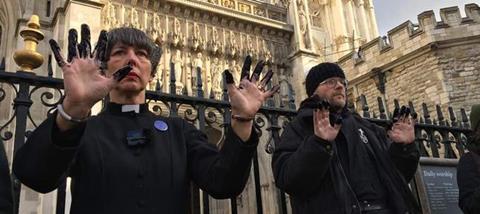
Christians have been a strong presence within high profile environmental protests over the last year, with dozens of members of Christian Climate Action taking part in Extinction Rebellion protests. Despite some of the doom and gloom we’ve heard around climate change, there is lots of good news too. Here are some recent wins.
1 The Church of England will be net zero carbon by 2030
At a General Synod meeting in February the church agreed to aim for net zero carbon by 2030 instead of 2045. This is crucial because scientists and campaigners believe 2045 will be far too late. The motion came as the Church of England began its first ever Green Lent campaign with 40 days of prayer and action to encourage care for God’s creation.
2 Twenty Christian institutions are divesting from fossil fuels
In January they joined a rapidly growing ‘Fossil’ Free’ movement, where faith institutions represent almost a third of those divesting their funds from the fossil fuel industry. The movement has been so successful that some management companies have begun offering ‘fossil free funds’ to those who no longer wish to invest for example, their pension funds, in polluting resources. The 20 organisations included two Catholic dioceses, the United Reformed Church Synod of Wales and South Western Synod, two Catholic religious orders and some local Methodist churches.
3 The Court of Appeal ruled Heathrow Airport expansion was unlawful
Just last week an extra runway at Heathrow was put on hold because the government failed to take account of the climate crisis when deciding to give the go-ahead.This was the first major ruling in the world to consider the Paris Climate Agreement of 2015, which commits us globally to limit the average rise in global temperature to 1.5?C. At the same time National Express has vowed to have a ‘zero emissions’ bus fleet by 2035 and plans to expand Bristol airport were rejected last month over concerns it would exacerbate the climate emergency. This is good news because transport accounts for a third of the UK’s carbon dioxide emissions.
4 The government is currently holding a Citizens’ Assembly
From January-March 2020, 110 randomly selected people, who are a representative sample of the UK population, will be meeting four times to consider the climate emergency and propose solutions. Their views will be reported to government in the spring. Citizens’ Assemblies have been used in other countries to successfully move forward issues where people no longer trust their politicians to solve the problem or where there is deadlock. A Citizen’s Assembly is one of Extinction Rebellion’s three demands, with the others being for the government to declare a climate emergency (which they’ve also done) and to achieve net zero carbon as a country by 2025 (we’re currently aiming for 2050).
5 Christians are actively involved
Christians have been a strong presence in the Extinction Rebellion protests in London. Members of Christian Climate Action were involved in creating a ‘Faith Bridge’ – a site of worship, prayer and protest within the larger protest – at the October 2019 rebellion. We held Eucharist services, prayed, worshipped, gave sermons, baptised people (in a paddling pool!) and washed protesters’ feet. Many of those arrested were Christians who have given accounts of interceding for the climate crisis during their time spent in police station cells.
As I write this article, someone is praying in Parliament Square. Throughout Lent Christian Climate Action, alongside other faith groups, is holding a 24/7 Prayer Vigil outside the Houses of Parliament to lament our lack of action on the climate emergency and pray that our political leaders find the courage they need to take the urgent action necessary. There is much to be sad about when it comes to the climate crisis, but there is also hope.
Caroline Harmon is a member of Christian Climate Action, a group taking prayerful direct action to tackle the climate crisis. CCA just published their first book, Time to Act, a resource book for Christians who want to take action on the climate crisis
Premier Christianity is committed to publishing a variety of opinion pieces from across the UK Church. The views expressed on our blog do not necessarily represent those of the publisher.




























